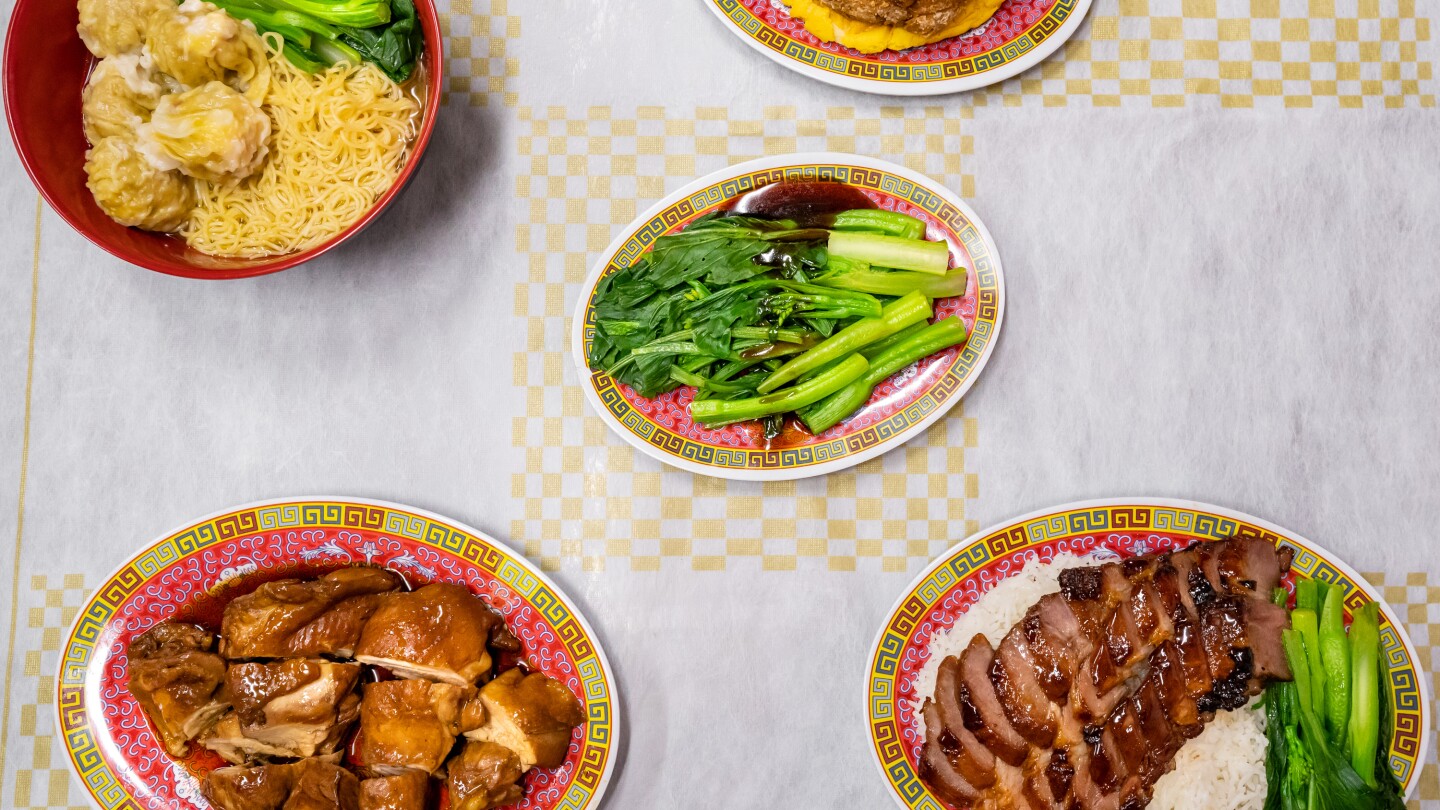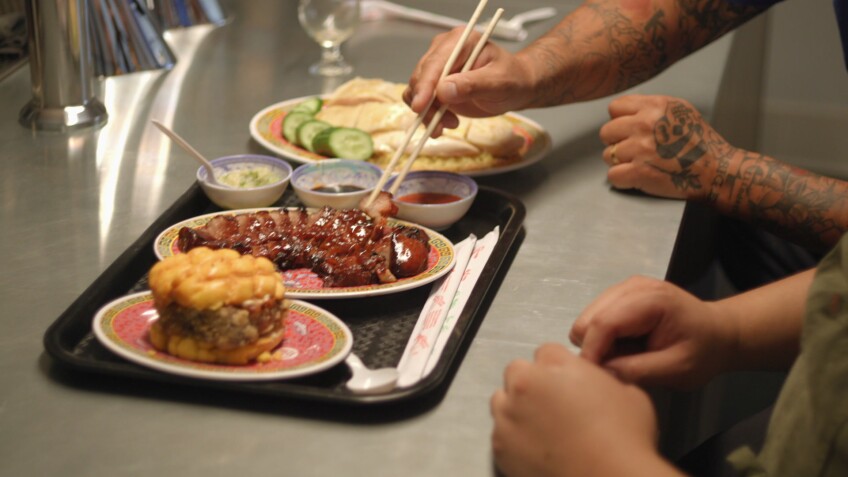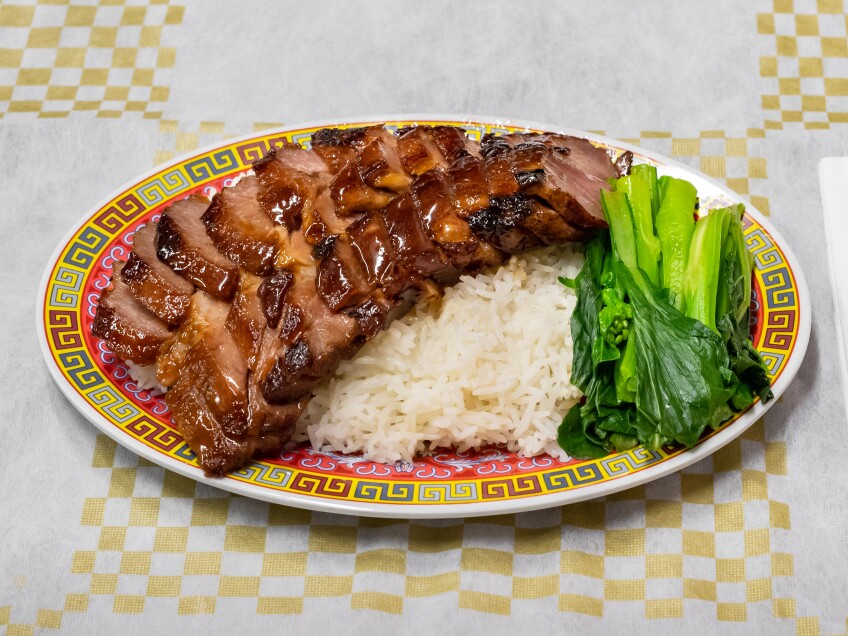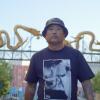
Pearl River Deli Navigates Gentrification and Renewal in L.A.'s Chinatown
In Malcolm Gladwell's book "Outliers," he claims it takes 10,000 hours of practice to master a skill. The same could be argued for chef Johnny Lee, who's built a name for himself making Hainanese chicken rice. He's cooked at least 10,000 or more birds in his culinary career.
Lee, 35, has been the owner of Pearl River Deli (PRD), a Cantonese comfort food restaurant in Chinatown, since early 2020. He recently closed his Far East Plaza location to relocate PRD to bigger digs (from 500 to 1,500 square feet) in the nearby Central Plaza, with hopes of launching it in February. He's also part of a new generation of Asian chefs and restaurateurs who have set up shop in a historic and cultural neighborhood that is changing in many ways.
While PRD may be known for its Hainanese chicken rice weekend special — succulent, skin-on poached poultry sliced into chunks and served over a bed of schmaltzy garlic rice with a trio of ginger-scallion, soy and chili sauces — its other dishes have also received considerable recognition.
Lee fries a breaded, bone-in pork chop and sandwiches it between sliced bolo bao, a sweet, yellow-hued Chinese bun with a crackly sugar top. His roasted pork belly and char siu have also become fan favorites. Last July, The New York Times listed PRD as one of the most exciting places to eat in Chinatown.
The Hainanese Chicken Rice Craze
Lee, who often traveled to Asia (pre-pandemic), wanted to bring the same refinement to Hainanese chicken rice that he had seen overseas. A few years ago, he debuted it to the public at the Chinatown After Dark pop-up events. He was surprised by its popularity.
"You can get this dish anywhere, but there aren't too many places that do it really well," Lee explained. "At most places, the chicken is overcooked and that's the thing I hate the most: chicken breast that's cooked until it's tough and rubbery. I thought, as long as I could try to cook the chicken to be better and do it a little more carefully, then it would go over well. And people responded well to it."

Lee takes a very data-driven approach to his chicken, diligently monitoring thermometers to get an exact temperature (it's between 150 to 155 degrees Fahrenheit) so that the meat ends up with a perfectly velvety texture. He cooks whole poultry as a way to appreciate it in all its entirety, and has taken note of how the skin even contracts differently from the meat when you poach it whole versus cooking it in pieces.
Those Chinatown After Dark pop-ups led him to open Side Chick, which specializes in Hainanese chicken rice, at Arcadia's Westfield Santa Anita mall in 2016. A couple of years into it, he began stepping away from the business. He then left for Chicago to pursue other projects before returning to Los Angeles and opening PRD.
Modern Businesses Moving into Chinatown
In PRD's early days, Lee was able to test out the business to see if it had legs, by renting the diminutive Far East Plaza space month to month. When he felt like it had potential, he signed a lease and stayed there until last November.
Lee is cognizant that getting to refine his craft is a privilege that older Chinatown restaurant owners don't have: "I think a lot of the restaurants here, unfortunately, don't have the privilege of thinking that way because they're just trying to make money and survive and pay their bills. Because I'm of this next generation of Asian chefs that have the ability and freedom to think a little less about survival and more about the craft, I can focus more on quality and still try to make a business case for it."

PRD is one of the more modern businesses in Chinatown, like Steep tea house and Sesame LA market. While the owners are part of the Asian American and Pacific Islander community, they have settled down in a low-income neighborhood that has been facing gentrification in recent years.
Last summer, Redcar Properties purchased Dynasty Plaza in Chinatown, and tenants fear they may face eviction. When the luxury Jia Apartments opened in 2014, its arrival indicated a shift in the area; today, a studio rental now goes for over $2,300. The median income for Chinatown residents was $19,500 in 2011, according to a community survey.
The pandemic has also derailed Chinatown businesses, partly due to anti-Asian sentiment. Many longtime businesses have permanently closed, like the 40-year-old Plum Tree Inn, during this period.
Lee views gentrification as a citywide problem, one that has been affecting not just Chinatown, but other neighborhoods such as Boyle Heights and South L.A. He believes the city government should work on fixing the issue. For Lee, he's just trying to keep afloat amid the pandemic, like other restaurant owners.

"I'm a solo operator," Lee said. "I don't have any business partners, which means I do everything myself, so it's difficult to find time to do more. But I'm always open, and if someone else were to spearhead something I would tend to say 'yes' more than 'no.'"
He said he's only operated in locations that previous tenants had vacated, and that it's never been the result of forcing anyone out. Lee and his staff speak Cantonese, and whenever older community members stop by and inquire about PRD's food, they speak to them in their language. He feels part of the community because he grew up visiting Chinatown.
Lee, who immigrated to the United States from Southern China when he was one, grew up in Lincoln Heights. He recalled how his home was just a five-minute bus ride to Chinatown, an area he and his family would frequent multiple times a week to buy groceries. In the 2000s, when his family moved to the San Gabriel Valley, those trips to Chinatown became more and more infrequent.
You want to run a good business, but you also want to be part of the community.Sissy Trinh, Southeast Asian Community Alliance
Sissy Trinh, founder of Southeast Asian Community Alliance, a nonprofit in Chinatown that works to strengthen communities, says she understands businesses don't go into neighborhoods like Chinatown to intentionally gentrify it. But she believes that in order to be an invested stakeholder in Chinatown, you have to do more than just be focused on your own business.
"You want to run a good business, but you also want to be part of the community," Trinh said. "And what does that mean to be part of a community that's not just culturally specific but also low income, out of a business that is catering to higher income folks? [You have to think] what are the ways in which you can be thoughtful and supportive of the people who are struggling."
A Humble Beginning
In Lee's formative years, he remembered his mother would cook dinner every night and his family would gather around the table together as a ritual. Some of his favorite meals were her steamed fish with soy sauce and clay pot rice with Chinese sausage. "A lot of times, she would just poach a chicken, cut it up and serve it simply — like a Hainanese chicken — with soy sauce," Lee recalled.
Lee didn't always think he was going to work in the culinary industry. He studied business administration at UC Riverside, but graduated in 2008 during the Great Recession. Without any job prospects, he took a gig helping his mother's friend open a restaurant in Colorado as a waiter.

"I found out I liked working in restaurants," Lee said. "I liked the pace of the work, the people and meeting customers."
He decided to move from working in the front of the house to cooking in the kitchen. His career took him to the now-closed Rivera, Sticky Rice and Egg Slut.
When PRD opens in its new location, it'll be reminiscent of its old outpost, but with indoor and outdoor dining. The hits such as the Macau pork chop sandwich and char siu will be standbys. Lee will also be adding Hong Kong-style breakfast items, like rice porridge, Asian crullers, seared daikon radish cakes, siu mai and hot soy milk.

Laura Hoang of Largwa, whoseInstagram is filled with photos of her creations — from pandan canelés to chocolate passionfruit madeleines — will be PRD's in-house baker, making Asian-inspired pastries.
And of course, the star of the show, the Hainanese chicken rice, will make an appearance, most likely more than just on the weekends.



